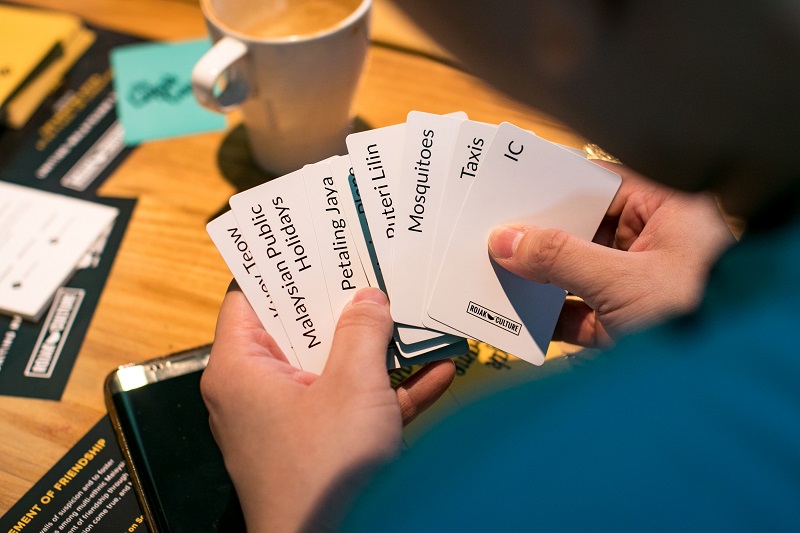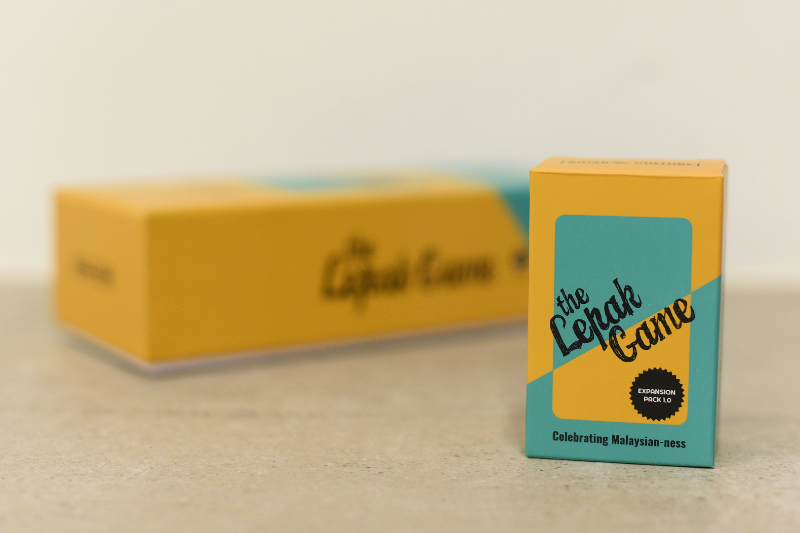
Hanlon and Khor (Photo: Sam Fong/The Edge)
As an interracial couple, Stephen Hanlon and Trixie Khor found that learning the little nuances of each other’s culture was part of the day to day. “We have to redefine terms: As an American, he says ‘purse’; meanwhile, as a Malaysian, I call it a ‘handbag’. When we’re cooking, I’d say ‘pass the pepper’; but, to Americans, ‘pepper’ can mean bell peppers or chillies,” Khor laughs.
Before their marriage in 2008, Khor realised that she had become disillusioned over the politics and state of affairs in her home country. “Then, in comes this American, who was enjoying Malaysia. He was living in Penang already, but when he moved to KL, I got the chance to show him around and watch him celebrate Malaysia. It helped me to re-celebrate everything rather than be jaded. He even loves cili padi, and he’s the one packing Maggi [mee] when we go to the States,” she says.
lg_1242.jpg

The couple love hosting, so they often invite friends over to play board games. They would play the American game Apples to Apples — an old game that is very similar to Cards Against Humanity. “When we played, I realised that this game really helped me to learn about American culture, icons and slang. And I also observed the dynamics of his American friends playing — they have so many inside jokes,” Khor explains. “Whenever we bring Apples to Apples out to play with other friends, everyone’s like, ‘Oh, we wish there was a Malaysian version of this.’ That’s how the idea began simmering.”
Khor used to be a chemist, but worked more recently in communications. Hanlon came to Malaysia to work with an NGO that focused on tsunami relief, but is now a freelance writer. The couple started the company Rojak Culture with the aim of fostering unity. “We have this desire to bring people together and bridge racial tensions and celebrate culture. We can do that through a game. When those ideas clicked, we went full force into this,” says Hanlon.
A Malaysian game is born
Rojak Culture’s brainchild, The Lepak Game, is essentially a Malaysian spin-off of Apples to Apples. Khor and Hanlon categorically state that they are not designers but occasional game players, so the method to their game’s creation is unusual. “We just wrote our ideas and words on index cards and came up with 1,000 words easily in a month or two. We played it with many people — our friends, family, friends of friends, neighbours,” says Khor.
Hanlon adds, “We were also bringing it to specific groups of friends and asking them what has to be in here from their perspective. What words from Indian culture do you want us to put in? What phrases from Malay culture, and so on.”
cyc_8916.jpg

The couple partnered with the founders of All Aboard Community Gaming Centre, a group that promotes gaming, to help test-play The Lepak Game. Taking in all the feedback and advice, The Rojak Culture tightened the quality of their game and went to manufacturing, where they hit their first major hurdle. Production was meant to be completed in three months, but was delayed for an extra six months because of a crucial mistake.
“So, imagine we’re doing 1,000 sets. Each set has 600 unique cards. The printers messed up the processes — they printed the cards, [but] didn’t assemble them correctly. It was just 600,000 cards all mixed up. They took handfuls of cards and threw them in boxes,” he says. For the next six months, with the help of their new friends from All Aboard, they laid out all the cards and managed to rearrange them properly.
“It was really like a blessing in disguise because what ended up happening was we launched on Malaysia Day in 2016,” says Hanlon.
Taking a winning gamble
Using her communications know-how, Khor invited the press for the launch. “I knew it was a gamble, like a media launch where we’re nobody is a risk. But Astro Awani came, among others,” she says. Within the first week of their launch, they sold 200 units, and in four months they sold out the first print run. The Lepak Game is now available in Kinokuniya, Apom, Naiise, Gerak Budaya, Ilham Gallery gift shop and online.
Unlike Cards Against Humanity (and just like Apples to Apples), each card in The Lepak Game has words or phrases with no fill-in-the-blank options. The Lepak Game is also different in that it includes power cards, totally Malaysian-inspired. “Blackout card is inspired by the blackout which happened two elections ago. With another power card, you can play two cards instead of one, inspired by the additional ballot box. With the Potong card, you choose one player to skip a turn and so on,” explains Hanlon. After getting feedback, Rojak Culture launched an expansion pack in 2017, which included more fill-in-the-blank variations.
Board games are still quite a niche market in Malaysia, but Rojak Culture hopes to encourage more people to put their phones down and spend quality time with other people. In response to players’ saying that The Lepak Game should have a glossary, the couple insist that people use this opportunity to make friends with more people and ask them.
While their aim is to create another game in the future, Rojak Culture also promotes other exciting new tabletop amusements that are uniquely Malaysian, such as Kaki Lima, Politiko, Cikgu Life and Rimba. “The core of what we’re trying to do isn’t merely to come up with this witty, catchy super fun game, but to celebrate Malaysianness, make multicultural bridging more accessible,” says Khor. “I was reading that the conventional way of doing this is through dialogues, thoughtfully facilitated, and you need a panel of experts. That’s not very accessible. Our vision is to build unity by celebrating Malaysianess, and our cards make that more accessible in a fun way.”
This article first appeared on Feb 10, 2020 in The Edge Malaysia.


